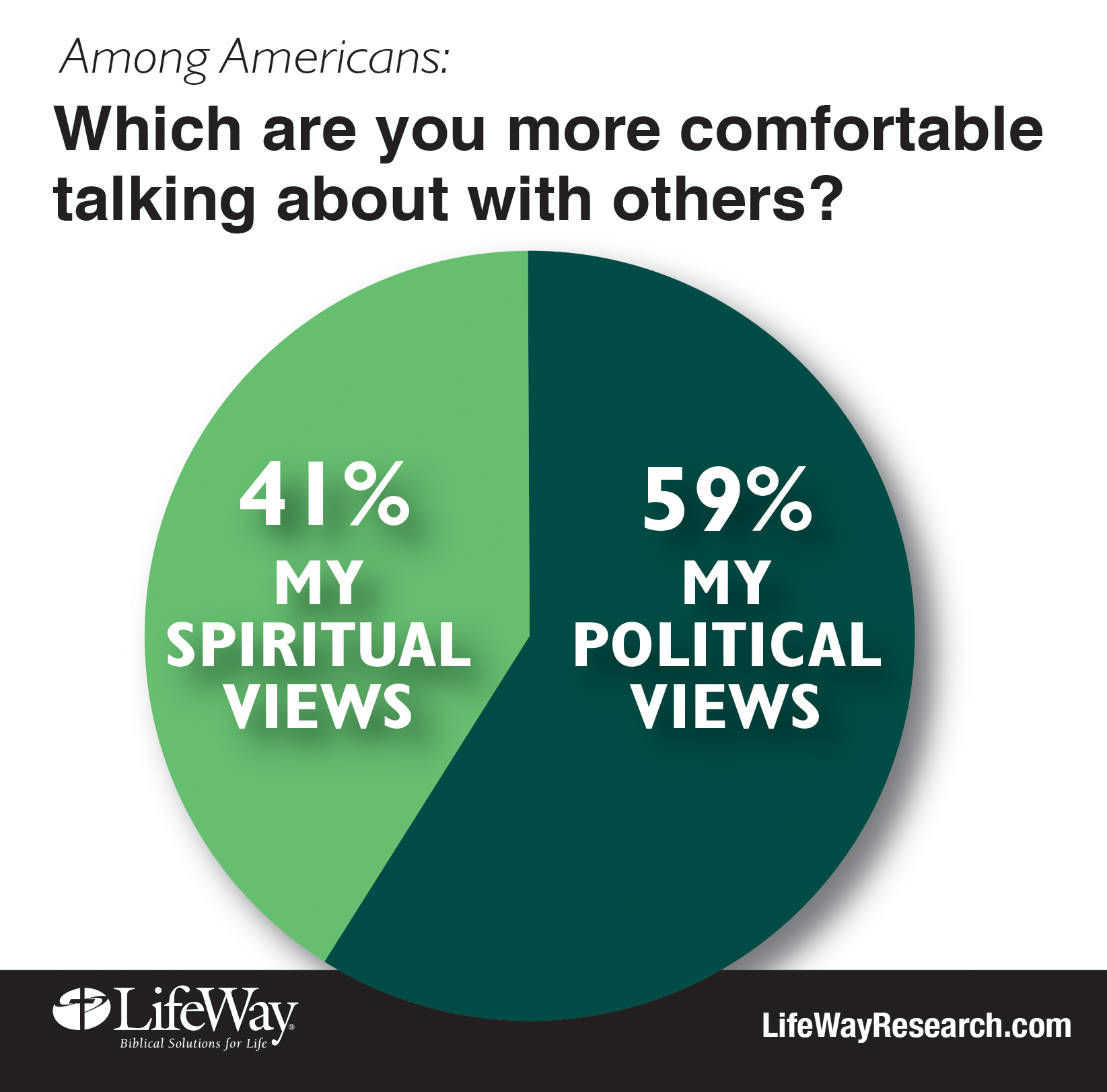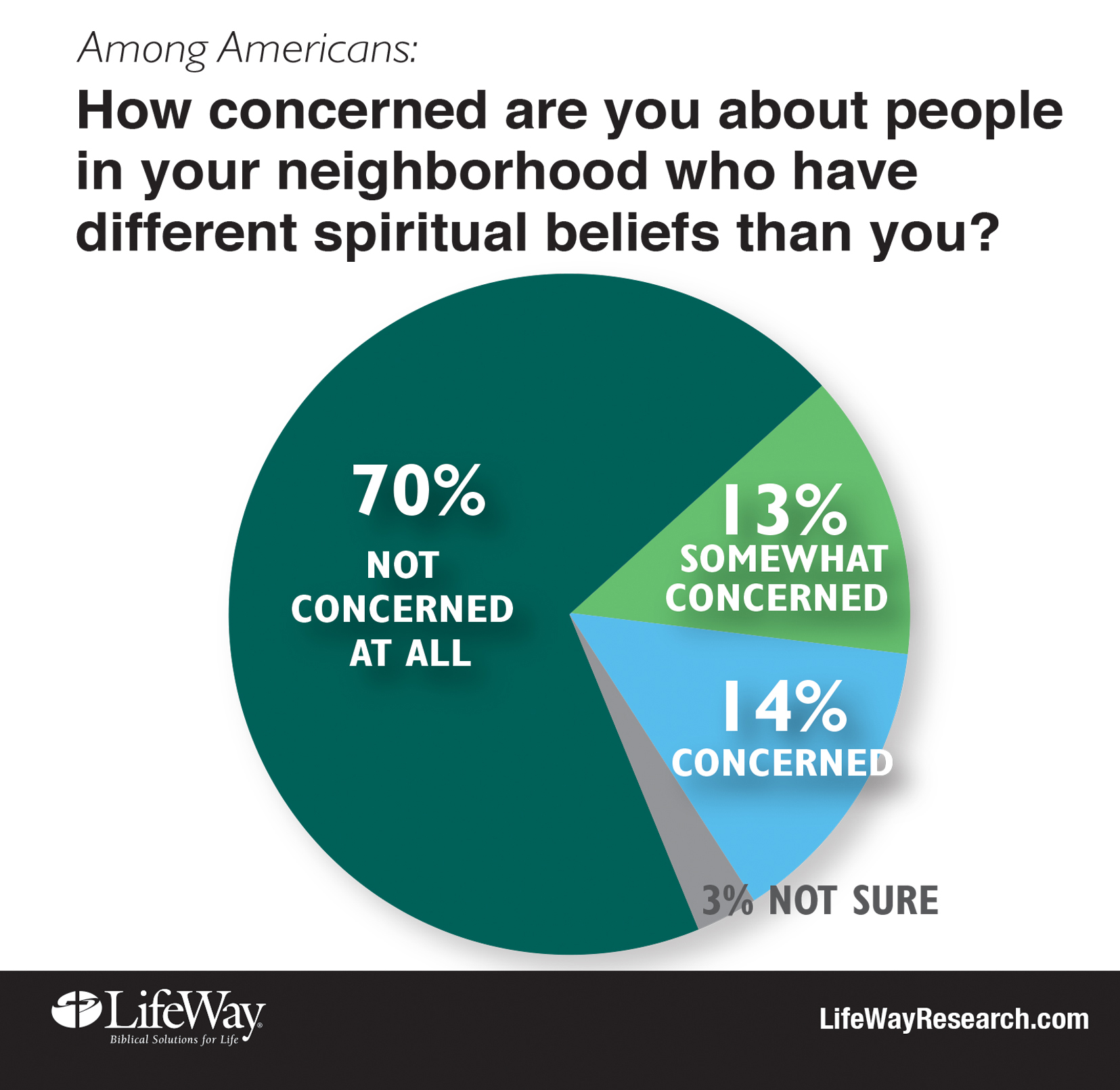
NASHVILLE (BP) — Politics trumps God for most Americans when it comes to conversations with their friends, a new study shows.
Six in 10 Americans are more comfortable talking about politics than their spiritual beliefs. And most say they aren’t interested in having more spiritual conversations.
 By contrast, evangelical Christians prefer talking about God over politics by a 2-to-1 margin.
By contrast, evangelical Christians prefer talking about God over politics by a 2-to-1 margin.
Those are among the findings of an online survey of 1,004 Americans about their views on spirituality and politics from LifeWay Research.
Scott McConnell, executive director of LifeWay Research, said Americans like to talk about both politics and religion, which are sometimes considered off limits in polite conversation. But they often prefer one to the other.
“People tend to discuss the things that matter most to them,” he said. “For evangelicals, that is their faith.”
As part of the survey, researchers compared how often Americans talk to others about politics to the number of times they talk about spirituality.
Two-thirds of Americans (64 percent) say they had at least three conversations about politics in the last month. Eight percent had no conversations about politics.
 By contrast, fewer than half (44 percent) had three or more spiritual conversations in the same time frame. Twenty-two percent had no conversations about spirituality.
By contrast, fewer than half (44 percent) had three or more spiritual conversations in the same time frame. Twenty-two percent had no conversations about spirituality.
Overall, 6 in 10 Americans (59 percent) say they’re more comfortable discussing their political views than their spiritual beliefs. But there are distinctions among certain groups.
Women (51 percent), those who go to church at least once a week (57 percent), and those with evangelical beliefs (63 percent) prefer to talk about their spiritual views. Men (69 percent) and those who don’t have evangelical beliefs (65 percent) prefer to talk about politics.
Most Americans also say they have about as many conversations about spirituality as they can handle.
About half (51 percent) say they have “just the right amount” of discussions on spiritual beliefs. A quarter (23 percent) want fewer spiritual discussions. Only 1 in 5 wants more. Six percent aren’t sure.
Hispanics (38 percent), those 18 to 35 (35 percent), and those who live in the West (30 percent) are more likely to say they have spiritual conversations “more often than I would like.”
Those with evangelical beliefs (32 percent), those 55 and over (26 percent), and those in the South (24 percent) are more likely to say they have such conversations “less often than I would like.”
Churchgoers are split. Three in 10 (29 percent) of those who attend at least once a week say they want fewer spiritual conversations. One in 4 (26 percent) wants more spiritual conversations.
Still, many Americans are open to hearing what other people think about faith. About half (52 percent) believe they have as much to find out as they do to share during a spiritual conversation. A quarter (26 percent) say they have more to find out. A similar number (22 percent) think they have more to share.
Evangelicals are more likely to believe they have more to share (32 percent) in a spiritual conversation. They’re less likely to say they have more to find out (17 percent). Frequent churchgoers also believe they have more to share (33 percent).
Those findings don’t surprise McConnell. Sharing one’s faith in order to convert others is a core evangelical conviction.
Still, he said, those with evangelical beliefs may need to listen more during a spiritual conversation.
“If you don’t care what your neighbors believe, chances are they won’t listen to what you have to say,” he said.
Philip Nation agrees. Nation helps manage Bible Studies for Life, which sponsored the survey. Evangelicals who want to share their faith may need to listen first, he said.
“The culture wants dialogue about spiritual beliefs,” said Nation, director of content development for LifeWay Christian Resources.
“Evangelicals too often only want to lecture our neighbors,” he said. “We need to learn the needs and worldview of our neighbors so we can effectively discuss the Gospel.”
Among other findings:
— Americans are split over sharing spiritual beliefs on social media. While 38 percent are comfortable or very comfortable doing so, a similar number (36 percent) are either not comfortable or don’t use social media.
— Few Americans (17 percent) say they are most comfortable sharing their views on social media. Three-quarters would rather discuss their beliefs one-on-one (40 percent) or in a small group (33 percent). Six percent would prefer not to share their views.
— Americans seem lukewarm about starting a spiritual conversation. Three in 10 say starting a conversation is interesting (30 percent), easy (29 percent) or natural (29 percent). Few say starting a conversation is scary (9 percent), boring (5 percent) or embarrassing (4 percent).
— Most churchgoers (72 percent) say they have the right amount of training to help them share their faith.
— About half of churchgoers (49 percent) say their church treats sharing the Gospel as extremely urgent (24 percent) or urgent (25 percent).
— Seven in 10 Americans say they are “not concerned at all” if their neighbors hold beliefs different from their own. Six in 10 (61 percent) say they aren’t concerned if their family has different beliefs.
Overall, McConnell believes Americans are open to talking about faith.
Few seem turned off by spiritual conversations, he said, especially if those conversations are in person and are respectful.
“If your friends are tired of arguing about politics on Facebook, trying asking them about God,” he said.
Methodology: The online survey of adult Americans was conducted March 17, 2016. A sample of an online panel representing the adult population of the United States was invited to participate. Responses were weighted by region, age, ethnicity, gender and income to more accurately reflect the population. The completed sample is 1,004 online surveys. The sample provides 95 percent confidence that the sampling error from this panel does not exceed plus or minus 4.2 percent. Margins of error are higher in subgroups. For more information, view the survey PDF at LifeWay Research.
LifeWay Research is a Nashville-based evangelical research firm specializing in surveys about faith in culture and matters that affect the church.














